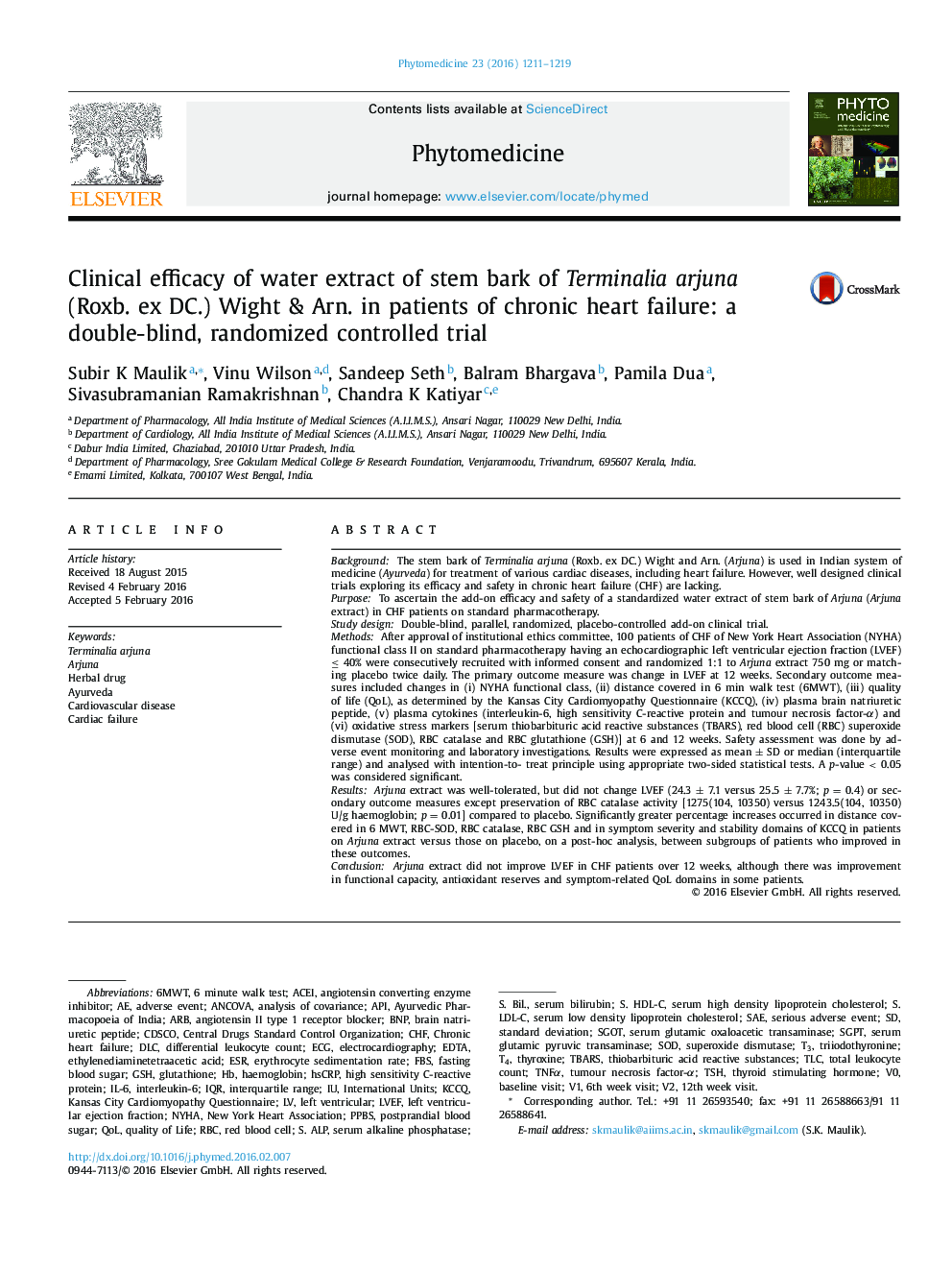| کد مقاله | کد نشریه | سال انتشار | مقاله انگلیسی | نسخه تمام متن |
|---|---|---|---|---|
| 2496204 | 1116113 | 2016 | 9 صفحه PDF | دانلود رایگان |
BackgroundThe stem bark of Terminalia arjuna (Roxb. ex DC.) Wight and Arn. (Arjuna) is used in Indian system of medicine (Ayurveda) for treatment of various cardiac diseases, including heart failure. However, well designed clinical trials exploring its efficacy and safety in chronic heart failure (CHF) are lacking.PurposeTo ascertain the add-on efficacy and safety of a standardized water extract of stem bark of Arjuna (Arjuna extract) in CHF patients on standard pharmacotherapy.Study designDouble-blind, parallel, randomized, placebo-controlled add-on clinical trial.MethodsAfter approval of institutional ethics committee, 100 patients of CHF of New York Heart Association (NYHA) functional class II on standard pharmacotherapy having an echocardiographic left ventricular ejection fraction (LVEF) ≤ 40% were consecutively recruited with informed consent and randomized 1:1 to Arjuna extract 750 mg or matching placebo twice daily. The primary outcome measure was change in LVEF at 12 weeks. Secondary outcome measures included changes in (i) NYHA functional class, (ii) distance covered in 6 min walk test (6MWT), (iii) quality of life (QoL), as determined by the Kansas City Cardiomyopathy Questionnaire (KCCQ), (iv) plasma brain natriuretic peptide, (v) plasma cytokines (interleukin-6, high sensitivity C-reactive protein and tumour necrosis factor-α) and (vi) oxidative stress markers [serum thiobarbituric acid reactive substances (TBARS), red blood cell (RBC) superoxide dismutase (SOD), RBC catalase and RBC glutathione (GSH)] at 6 and 12 weeks. Safety assessment was done by adverse event monitoring and laboratory investigations. Results were expressed as mean ± SD or median (interquartile range) and analysed with intention-to- treat principle using appropriate two-sided statistical tests. A p-value < 0.05 was considered significant.ResultsArjuna extract was well-tolerated, but did not change LVEF (24.3 ± 7.1 versus 25.5 ± 7.7%; p = 0.4) or secondary outcome measures except preservation of RBC catalase activity [1275(104, 10350) versus 1243.5(104, 10350) U/g haemoglobin; p = 0.01] compared to placebo. Significantly greater percentage increases occurred in distance covered in 6 MWT, RBC-SOD, RBC catalase, RBC GSH and in symptom severity and stability domains of KCCQ in patients on Arjuna extract versus those on placebo, on a post-hoc analysis, between subgroups of patients who improved in these outcomes.ConclusionArjuna extract did not improve LVEF in CHF patients over 12 weeks, although there was improvement in functional capacity, antioxidant reserves and symptom-related QoL domains in some patients.
Figure optionsDownload high-quality image (68 K)Download as PowerPoint slide
Journal: Phytomedicine - Volume 23, Issue 11, 15 October 2016, Pages 1211–1219
